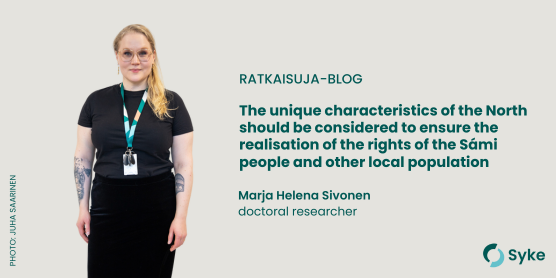
Climate change is warming the Arctic faster than any other region globally, impacting everyday life in the area. While fossil fuel production continues, policies aimed at mitigating climate change are widely discussed in the north. Furthermore, the Russian war in Ukraine has significantly altered the security and geopolitical context, underscoring the strategic importance of northern regions—particularly with Sweden and Finland now members of NATO. This text draws on research we conducted on the interrelations between two policy sectors: the energy transition and shifts in the security landscape in the Finnish and Norwegian Arctic regions.
A Changing North Directs Attention to Diverse Perspectives
Although Finland is an Arctic state, its northern characteristics should be considered particularly from the perspective of the Sámi Indigenous people and the local population. The Sámi are in an especially vulnerable position regarding climate change. Their challenges are two-fold: the direct adverse impacts of climate change affect everyday life, while climate change mitigation policies may also have harmful consequences for traditional ways of life and the realisation of human rights. For instance, materials needed for the energy sector's transition to less polluting sources are mined from the north, and additional land is required for wind energy production. New technologies are also being developed for hydrogen and battery storage. All of these require infrastructure, such as transmission lines.
The growing interest in defence, particularly in the form of intensified military practices, adds a new layer of pressure to land use in the region. In addition, locals can act as "eyes and ears" in remote areas. While this may be seen as supporting security, I also wish to raise questions of justice. Hence, should it be seen as the responsibility of an individual to support national security in this way? The issue becomes especially sensitive if participation in ensuring national security were the sole means by which one’s right to culture, language, living environment, and future was guaranteed.
Zooming in on the Basics of Democracy
Another important aspect of justice is political participation and representation. Resources to ensure the representation of northern viewpoints are scarce, as is access to knowledge and evidence necessary to inform fair policymaking. Distrust by indigenous people and local residents in policymaking processes concerning the Nordic Arctic is evident in the poor knowledge exchange, cursory engagement and lack of meaningful dialogue. Similarly, academic research is often viewed as pointless, as the benefits of participating in research are seen as minimal.
However, there may be hope for addressing these deficiencies in the future through the newly established Sámi Climate Council in Finland, as part of the new Climate Act. Its tasks include improving the knowledge base and incorporating the perspectives of the Sámi people into climate policy processes. Indeed, in its first statement the Council urged swift adaptation and mitigation measures for climate change, as the changes are rapidly altering both the environment and local circumstances.
The interrelations between justice and security were indeed highlighted in our research, and in the Arctic these two concepts are two sides of the same coin. Moreover, as researchers we also have a responsibility to engage in Arctic research that is both ethical and sustainable. This can be achieved by providing opportunities for meaningful participation, fostering learning, sharing knowledge, and repairing broken structures. Support and guidance for such initiatives is now available in the form of an information package: Ethical Guidelines for Research Involving the Sámi People in Finland.
Marja Helena Sivonen works as a researcher in Syke’s Climate Solutions unit. She is currently finalising her doctoral thesis in sociology at Tampere University. Her work includes policy analysis at the interface of energy, security, and justice, among other things. Friends, forests, fields, bogs, and sauna bring kindness and joy to her days.
Read more
Interrelations between security and the zero‑carbon energy transition in the Finnish and Norwegian Arctic
IDEALE Interplay between National Defence and Low-Carbon Energy Policies: a Sustainability Transitions Perspective
Evaluation of justice in climate policy
Sámi Climate Council secretariat
Opinions of blog contributors do not necessarily reflect the official views and opinions of the Finnish Environment Institute.